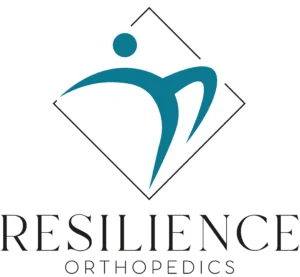Table of Contents
Osteoarthritis (OA) affects more than 33 million people in the US, that’s nearly 1 in 10 adults living with daily joint pain and stiffness. Without proper care, OA can lead to ongoing discomfort and make everyday activities harder to enjoy.
At Resilience Orthopedics in San Jose, I work with patients to help them move more freely and live with less or no pain. Keep reading to learn why it develops, the diagnosis, and the treatment options that can make a real difference.
Key Takeaways:
- Osteoarthritis occurs when the cartilage that cushions your joints wears down.
- Common symptoms of OA include joint pain, stiffness, swelling, reduced movement, and instability.
- Treatments may include physical therapy, weight management, medications, injections, and surgery.
What is Osteoarthritis?
Osteoarthritis is a common form of arthritis that develops when the smooth cartilage that cushions your joints gradually wears away. Without this layer, the bones rub against each other, which causes pain and stiffness.
OA can affect almost any joint, but it most often develops in the knees, hips, hands, fingers, and spine (neck and lower back).
There are two main types of OA:
- Primary osteoarthritis develops as we age and our joints experience regular, everyday use.
- Secondary osteoarthritis occurs when a joint is damaged by an injury, joint disease, or repeated strain, leading to cartilage breakdown.
Book a Consultation with Dr. Pamela Mehta, MD
The Best Orthopedic Surgeon in San Jose
Dr. Mehta is a board-certified orthopedic surgeon who can help you recover from your joint condition. If you:
- Are Suffering From Pain and Mobility Issues
- Need Orthopedic Assessment and Advice
- Want Treatment From a Top Orthopedic Doctor
We Can Help
Common Causes of Osteoarthritis
Osteoarthritis isn’t just “wear and tear.” It develops due to factors that affect the joint, including age, genetics, lifestyle, and past injuries.
Primary osteoarthritis usually doesn’t have a single cause, but these factors increase the risk:
- Getting older (especially after age 45)
- Being female
- Having a family history of arthritis
- Carrying extra body weight
- Past injuries like fractures, ligament tears, or dislocations
Secondary osteoarthritis develops due to serious injuries like an ACL tear, repetitive overuse from work or sports, or certain infections or diseases.

How Osteoarthritis is Diagnosed
At Resilience Orthopedics, diagnosing osteoarthritis starts with understanding your story and your joints. Here’s what you can expect:
- One-on-one consultation: We’ll discuss your symptoms, their impact on daily life, and your overall health to rule out other causes.
- Physical exam: I’ll assess your joint pain, stiffness, and range of motion to see how osteoarthritis affects you.
- Imaging: X-rays can reveal joint changes like narrowing or bony growths, and sometimes an MRI is used to check for early cartilage changes.
- Lab work: Blood tests may be done to rule out other types of arthritis or related conditions.
Signs You May Have Osteoarthritis
Osteoarthritis tends to develop slowly, and symptoms can vary from person to person depending on how advanced it is. You may notice:
- Joint pain or stiffness
- Reduced range of motion
- Swelling or mild inflammation
- Clicking, popping, or grinding sounds when moving
- A feeling that the joint is unstable or “giving way”
- Weakness or thinning of the muscles that support the joint
- Visible joint changes
If these symptoms sound familiar, don’t ignore them or try to push through the pain. At Resilience Orthopedics, I’m here to help you understand what’s happening with your knee, hip, or shoulder and find treatments that can help you move comfortably again.

Osteoarthritis Treatment Options in San Jose
While there isn’t a cure for osteoarthritis, there are many effective ways to relieve pain and stay active.
Lifestyle and Non-Surgical Care
Your daily habits play a big role in how your joints feel. Small, consistent changes can make a difference:
- Physical therapy: Targeted stretches and strengthening exercises help stabilize painful joints, improve flexibility, and support safe movement in your daily activities.
- Exercise: Gentle, regular movement keeps your joints flexible and your muscles strong. While rest can help during flare-ups, too much can worsen stiffness.
- Weight management: Even modest weight loss can reduce stress on your hips, knees, and back. Your lower-body joints feel about four pounds less pressure for every pound you lose.
- Medications. Over-the-counter or prescription options can make symptoms easier to manage. These include acetaminophen, topical NSAID creams or gels, prescription NSAIDs, and counterirritant creams.

Advanced Therapies
When lifestyle changes aren’t enough, advanced therapies can help support your joints and delay the need for surgery. These include:
- Injections: Regenerative options like stem cells, cortisone, and hyaluronic acid injections may help ease joint pain by improving lubrication and circulation within the joint.
- Platelet-rich plasma (PRP) uses a small sample of your own blood to concentrate platelets, which are then injected into the affected joint. It may help reduce pain and stimulate natural tissue repair.
Surgery
Most people with OA never need surgery. But, if pain in your knee or hip continues despite physical therapy, medications, or injections, surgery might be worth considering.
- Arthroscopy is a minimally invasive procedure that removes loose cartilage and repairs small areas of damage through tiny incisions.
- Joint replacement: Many patients experience minimal pain after hip or knee replacement. Outcomes are generally best when surgery is done before significant muscle weakness or loss of function develops.

Why Choose Resilience Orthopedic in San Jose?
At Resilience Orthopedics, I understand that osteoarthritis affects everyone differently. Some people benefit most from physical therapy or injections, while others eventually need surgery.
Surgery is never the first or only option. As a board-certified orthopedic surgeon, my goal is to provide care that feels personal. Every visit begins with a conversation about how you’re feeling, what you’d like to improve, and what’s holding you back.
After that I’ll walk you through what’s happening in your joints, how it affects your movement, and what options can help you feel and function better. You’ll know your choices and what to expect moving forward.
Take the First Step Toward Relief
Living with osteoarthritis can make even simple movements uncomfortable and take away activities you enjoy.
At Resilience Orthopedics, we listen to your story and create a plan that fits your body, lifestyle, and goals. If you are in San Jose, Santa Clara, Mountain View, or anywhere in the Bay Area, I’m here to help you understand your pain and find relief.
Book a consultation today and take the first step toward feeling like yourself again.
Ready to Recover?
Take the first step in getting back to your normal self, and book an appointment with Dr. Mehta today.
We’re ready when you are!
FAQs
What’s the Difference Between Osteoarthritis and Arthritis?
Arthritis is a broad term that describes any condition causing joint inflammation. Osteoarthritis is the most common type. It occurs when the protective cartilage that cushions your joints gradually wears down over time.
How Do I Know If My Osteoarthritis is Severe?
Your osteoarthritis may be severe if it limits your movement. Imaging tests like X-rays can also help your doctor determine the severity. Signs like large bone spurs or major joint space narrowing often indicate advanced osteoarthritis.
How Do I Know If I Need Surgery for Osteoarthritis?
If your pain continues despite physical therapy, medication, and injections, your doctor might discuss surgical options with you.
How Do I Know What Stage of Osteoarthritis I Have?
Your orthopedic specialist will evaluate your symptoms, check your joint movement, and review imaging results to determine the stage of your osteoarthritis. This helps guide the best treatment plan for your needs.
Can Osteoarthritis Be Reversed?
Osteoarthritis can’t be reversed because the cartilage loss is permanent. But with exercise, healthy habits, and the right treatment, you can ease pain, protect your joints, and enjoy your life.



